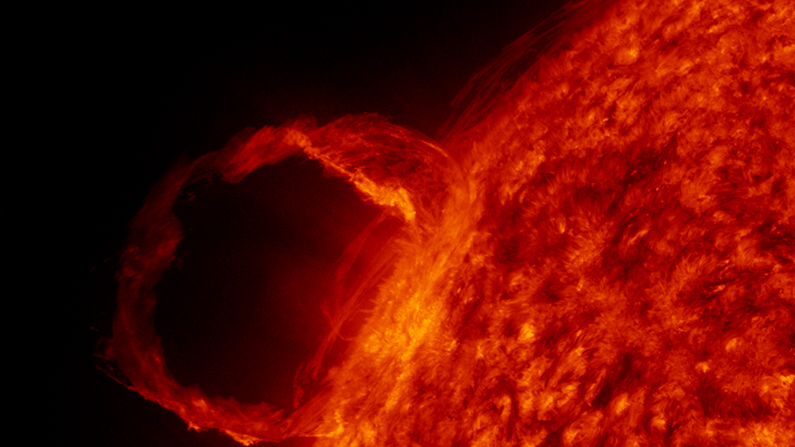Is our modern technology-run society about to be all but eliminated by “bad weather” from outer space?
This may sound like the premise of a bad science-fiction movie, but it is in fact a daunting reality, according to Britain’s Meteorological Office.
A report, co-authored by scientists from the British Antarctic Survey, Rutherford Appleton Laboratory, and Cambridge University, warns that powerful solar flares have the potential to ruin almost everything electronic and cause tremendous chaos to our way of life.
These solar flares come along two or three times every 200 years, the report stated. The damage they could do in the United Kingdom alone could top $20 billion, according to the Met Office study.
Solar flares are not uncommon, but like hundred-sear storms on Earth, there are hundred-year storms on the Sun. And these solar storms send gigantically powerful magnetic waves washing over the Earth.
Everything electronic could be literally fried, the report warns. No computers, no cell phones, no internet—and not only could our devices fail to function, they could actually burst into flames.
A gigantic solar flare which occurred in 1859 doubled the brightness of the Sun for a few minutes. When the ensuing magnetic wave hit the Earth, it shorted out telegraph wires all across Europe, which ignited widespread fires, The Sun reported.

There was no national power grid 150 years ago. But today, every civilized nation is crisscrossed by high-tension wires. Every home has numerous electrical cables leading into it. Even rural areas have power lines crossing them.
If all these simultaneously stopped transmitting or burst into flame, the result would be the kind of apocalyptic chaos only found in science-fiction movies.
No one would be able to report fires. The computers which govern vehicles, including fire trucks and ambulances, would stop working. Electrical pumps for water intrastructure would grind to a halt. Some hospitals might have emergency generators but their control modules might also be damaged.
Satellite Safety Net

The answer, according to the teams of scientists who authored the report, is an early-warning system.
The scientists envision a ring of satellites around the Earth that monitor solar activity. In the event a giant flare was detected, the various governments could be warned to shut down their power grids just before the moment of impact.
It would take about a week for the magnetic energy to reach Earth, during which time important services, like hospitals, military bases, police, and fire-fighting stations could secure back-up power sources, and make sure anything unusually sensitive be shielded.
While this would prove both disruptive and expensive, it would be far less destructive than a nationwide or even continent-wide power outage accompanied by a loss of all communication and exploding electronic devices.
The United Kingdom currently has satellites in space that monitor the Sun. However, the units—the Solar and Heliospheric Observatory launched in 1995 and the twin Solar Terrestrial Relations Observatory (Stereo) probes launched in 2006—are nearing the end of their effective lifespans.
These satellites have been exposed to solar radiation and cosmic rays for decades and are in need of being replaced, the report states. The MET also said there was a great need for a space-weather survival plan for the United Kingdom.
Watch Next:


